Does Accutane Help With Scars?
Acne is one of the most common skin conditions in the United States, affecting approximately 50 million Americans each year. When left untreated, acne breakouts may become severe and difficult to clear, particularly when the pores become clogged with bacteria. Beyond the frustration of an active acne breakout, severe acne can have long-lasting effects, causing damage to the skin, impeding the healing process, and leading to scarring. Acne scars can be depressed (atrophic), raised (hypertrophic), or discolored. They can be a source of distress for patients long after the initial acne breakout has cleared, leading many to wonder what the best treatment option is for preventing acne scars. For cases of stubborn, severe acne, expert board-certified dermatologist Dr. Michele Green may turn to Accutane treatment.
Accutane is a brand name for isotretinoin, which is a form of retinoid that is highly effective at curing even the most stubborn, severe breakouts of acne vulgaris and preventing the formation of acne scars. Isotretinoin treatment is extremely effective for patients whose acne has not responded to topical creams or other oral medications, providing patients with long-lasting, clear skin in 4-6 months. Isotretinoin is a powerful drug that is only available when prescribed by a healthcare provider or dermatologist, such as Dr. Green, and monitored every month to assess the potential side effects. While Accutane cannot remove existing acne scars, it is highly effective in addressing severe acne and preventing the formation of new ones. To seek expert medical advice and find out if Accutane is the right treatment for you, schedule your initial consultation with Dr. Michele Green.
Expert, board-certified dermatologist, Dr. Michele Green, has been safely prescribing Accutane at her New York City Upper East Side dermatology office for years. Always cautious of her patients’ safety, Dr. Green takes the time to review each patient’s individual medical history before recommending any cosmetic or medical treatment. Dr. Green offers a wide range of skincare and medical treatments in her office, including chemical peels, microneedling, laser treatments, dermal fillers, and her proprietary MGSKINLABs products, which produce various creams and serums to maintain clear, bright, and youthful-looking skin. Lauded for her consistently high standards of practice and high patient satisfaction, Dr. Green has been voted one of the best healthcare providers in New York City by such publications as New York Magazine, Super Doctors, and Castle Connolly.
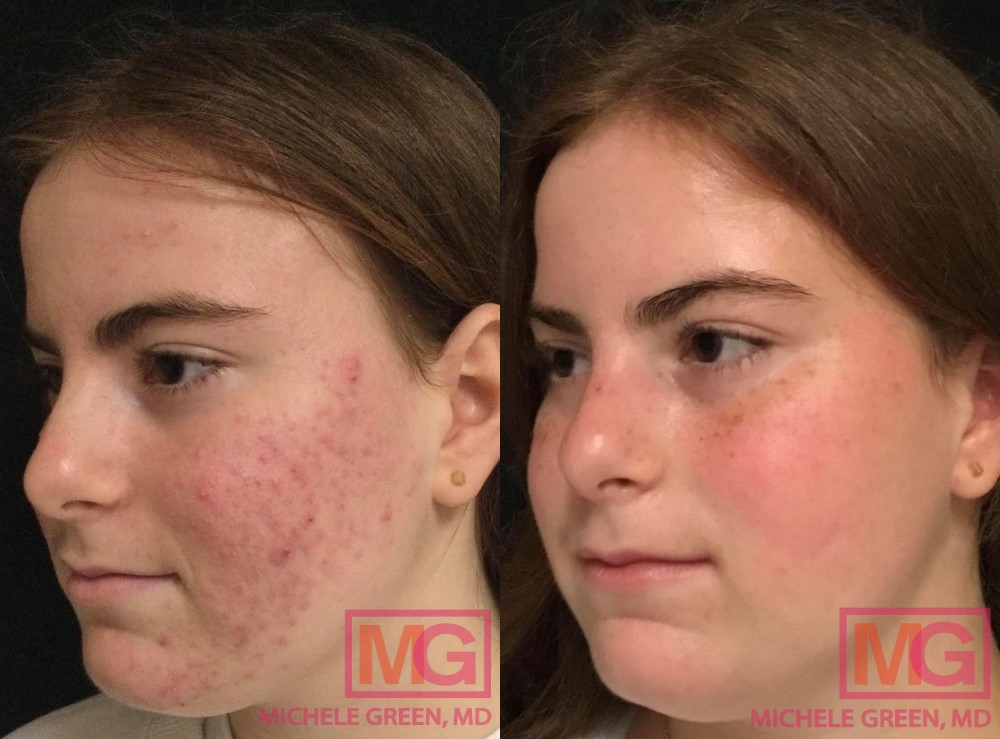
What is Accutane?
Accutane is a prescription oral medication used in its standard dose to treat moderate to severe acne breakouts, including cysts, nodules, and pimples, that have not responded to topical treatments, oral antibiotics, or medications like spironolactone. It is the brand name for isotretinoin, which is a Vitamin A derivative similar to tretinoin or retinol. Typically prescribed as a last resort for stubborn forms of moderate to severe acne, Accutane is a powerful treatment option that shrinks the sebaceous glands responsible for the overproduction of oil on the skin’s surface, reducing the physical pathways for acne formation. A full-dose regimen of isotretinoin treatment typically lasts for 4-6 months. It is often associated with mild to moderate side effects for the majority of patients, including dry lips, dry skin, a dry nose, and increased sun sensitivity. Once patients have completed the 4-6 month treatment process, the incidence of severe acne lesions is significantly reduced. Due to the highly regulated nature of the medication, the treatment process is quite safe, with stunning results. 95% of patients see a decrease in severe acne within the first six months of treatment, and 50% of patients who underwent the full Accutane regimen report not needing to seek acne treatment again.
How does isotretinoin work for acne scar treatment?
Accutane is FDA-approved to treat forms of severe acne and is the ideal treatment for acne that has not responded to other forms of treatment. The most severe types of acne are nodular and cystic acne, which manifest as swollen, red, inflamed, and painful bumps that form on the skin’s surface. Acne breakouts are caused when the pores on the skin become clogged with natural oil, known as sebum, and dead skin cells, and can become infected and inflamed when bacteria are trapped inside the pores. These bacteria-infected pimples can form nodules or cysts on the skin’s surface, leading to unsightly bumps and acne scarring. When these pimples do not respond to oral or topical medications, oral isotretinoin is the most effective treatment option to eliminate severe acne breakouts.
Accutane is not specifically prescribed for acne scar treatment. Rather, it is most effective for preventing future scarring by addressing severe active acne breakouts. Accutane works by destroying the sebaceous glands that produce excess sebum and limiting skin cell production in the pores, which helps control the amount of oil on the skin and prevent clogged pores with sebum and dead skin cells. Additionally, isotretinoin alters the skin’s ecology by eliminating acne-causing bacteria, thereby reducing inflammation in the pores. The decreased oil production and elimination of acne-causing bacteria occur throughout the body, making Accutane effective in treating acne vulgaris on the face, chest, back, and arms, leading to overall improved skin health.
What are the side effects of Accutane treatment?
Accutane is a powerful medication that is associated with potential side effects. The vast majority of patients who take Accutane for severe acne only experience mild side effects that may cause some discomfort but can be relatively easily addressed and do not cause any lasting damage to the body. The most common side effects of isotretinoin include:
- Chapped lips and dry mouth
- Dry skin or general dryness
- Itchiness
- Dry nose and nosebleeds
- Dry eyes or trouble with night vision
- Joint pain
- Rash or skin infection
- Thinning hair
- Increased sun sensitivity
- Yellowing of the eyes or skin
The most common side effects include chapped lips (in 90% of users), dry skin (in 80% of users), light nosebleeds (in 80% of users), dry eyes (in 40% of users), and joint pain (in 15% of users). For dry skin, Dr. Green recommends using a gentle moisturizer throughout the Accutane treatment regimen. For sun sensitivity, Dr. Green advises patients to wear sunscreen with an SPF of 30 or higher whenever they go outside during the sun’s most intense hours.
There are risks of more severe side effects associated with Accutane treatment, but they are very rare. Only 1 in 500 patients experience severe side effects, and generally, any lasting damage can be avoided if the dosage of the drug is decreased or treatment stops altogether. More serious side effects of Accutane include:
- Inflammatory bowel diseases, such as Crohn’s disease or ulcerative colitis
- Mental health problems, including psychosis, new or worsening depression, or suicidal thoughts
- Erectile dysfunction and loss of libido
- Changes in blood sugar, triglycerides, or cholesterol
- Pancreas inflammation
- Headaches
- Nervous system changes, such as drowsiness, dizziness, or blurred vision
Accutane has been shown to increase the risk of birth defects, including premature birth and physical malformities. As such, Accutane is strictly forbidden for patients who are pregnant, looking to become pregnant, or breastfeeding.
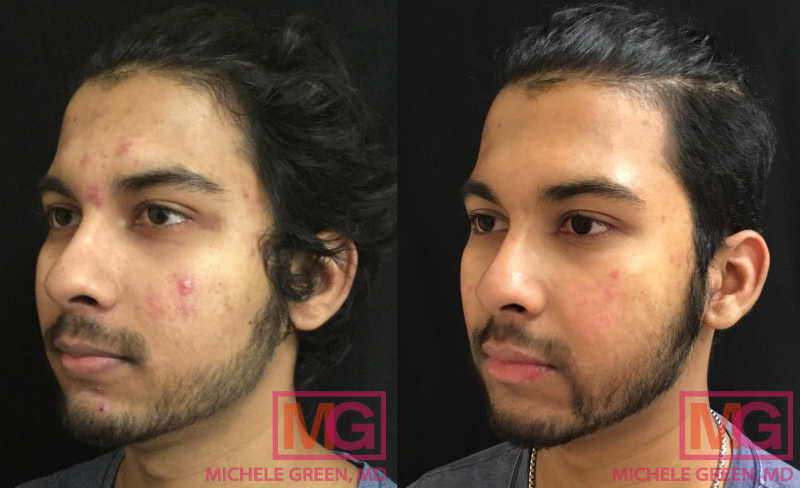
Do dermatologists recommend Accutane for acne scar treatment?
For patients experiencing severe acne breakouts, Dr. Green may recommend Accutane treatment if other treatment methods have not been effective. While Accutane treatment may not be effective in removing or eliminating existing acne scars, it is one of the most effective options for treating active acne breakouts that are at the highest risk of scarring. Before prescribing Accutane, Dr. Green will discuss the benefits and risks, providing patients with all the necessary information to follow the treatment plan. To find out if Accutane is the right treatment option for you, schedule your initial consultation with expert board-certified dermatologist Dr. Michele Green.
What is post-Accutane scar treatment?
Once you have begun your Accutane treatment plan for active acne breakouts, it is essential to follow all aftercare instructions and attend post-treatment check-ups as directed. Due to the intense nature of the drug, patients taking Accutane are monitored every month to ensure that they are experiencing no adverse events or serious side effects. When a patient is prescribed Accutane, they must register for the iPLEDGE program (https://www.fda.gov/media/86131/download), which helps providers to keep their patients safe. Isotretinoin is associated with severe birth defects, and, as such, healthcare providers need to ensure that female patients of childbearing age are not pregnant or breastfeeding when taking Accutane. The iPLEDGE program requires female patients to take monthly pregnancy tests and use two forms of birth control for the duration of the treatment process. Furthermore, the program requires monthly blood tests for all patients to ensure the liver is functioning properly while on the medication. With these protective measures in place, Accutane is made safer for all patients.
Does Accutane help with scars?
Patients often ask, “Will Accutane help with scarring?” Acne scars are a common occurrence following an acne breakout that gets inflamed or infected by bacteria that live on the skin’s surface and get trapped in the pores with dead skin cells and oil, known as sebum. When not addressed promptly, this inflammation can lead to permanent acne scarring. Picking or scratching at an active acne breakout can also lead to scarring, as picking at acne lesions can transfer bacteria from the hands onto the lesions and the surrounding skin, with the bacteria causing damage to the tissue. Acne scars can take on many different forms, ranging from depressed scars, which include ice pick scars, boxcar scars, and rolling scars, to raised scars, also known as hypertrophic scars, and hyperpigmentation of the skin. These scars can also appear on various areas of the body, including the face, back, chest, shoulders, and arms, wherever acne breakouts occur. While Accutane is not used to eliminate acne scars, it can help prevent scarring in cases of severe acne.
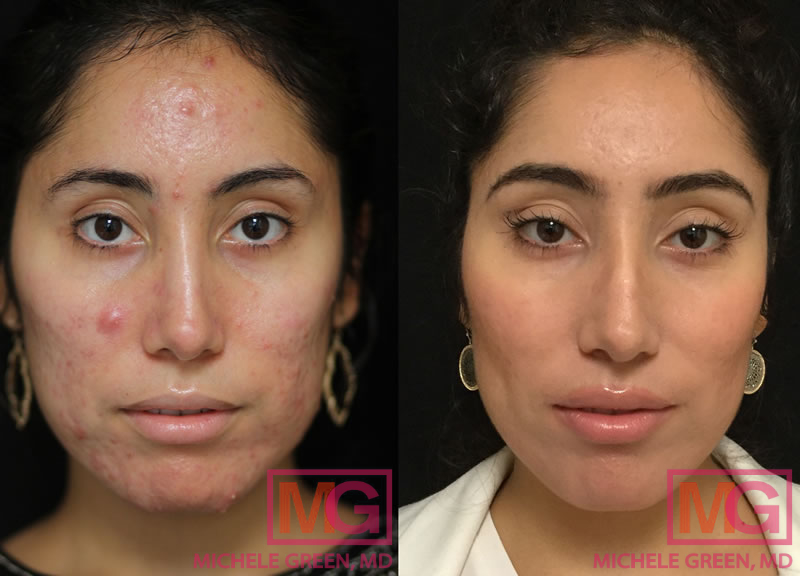
Does Accutane get rid of scars?
Patients often wonder, “Will Accutane get rid of scars?” While Accutane is highly effective at eliminating active severe acne breakouts, the medication is not used to get rid of already existing acne scars. However, at Dr. Michele Green’s Upper East Side, New York City dermatology office, there are many treatment options available for reducing the appearance of all types of acne scars. To address depressed scars, skin resurfacing treatments, such as ablative or non-ablative laser treatments, chemical peels, and microdermabrasion, are highly effective, as are filler treatments and collagen-induction therapy (microneedling). Intense pulsed light and radiofrequency treatments can help to remove pigmentation and tighten the skin, respectively, to decrease the visibility of the scarring. Deep acne scarring may require minimally invasive treatments, such as subcision or punch excision, where deep scars are removed through an incision and a skin graft. When you consult with Dr. Green, she will review all of the potential options to help you determine the treatment plan that works best for you.
What does Accutane do to your scar?
Accutane is a medication that is used to address severe acne breakouts on the face, chest, back, and arms by decreasing the number of sebaceous glands to reduce the amount of excess sebum on the skin’s surface. The medication can also boost collagen production and skin cell turnover, which can have a mild effect on existing scars. By boosting skin cell turnover, Accutane may improve the appearance of post-inflammatory hyperpigmentation associated with acne scars. However, Accutane will not help to fill in depressed acne scars. For this reason, patients should consider other treatment methods, such as chemical peels, laser treatments, microneedling, or dermal fillers.
Does Accutane get rid of acne marks?
Accutane is a highly effective acne treatment that can be used to cure even the most severe cases of cystic acne. It can be used in low doses for moderate cases of acne vulgaris. The oral medication works over 16-20 weeks to eliminate active acne breakouts found anywhere on the body and prevent the formation of acne scars. Accutane is a good option for any patient with acne that does not respond to usual methods of breakout reduction, including other oral medications, chemical peels, laser treatment, or photodynamic therapy. If you are struggling with stubborn acne, schedule a consultation appointment with Dr. Green to determine if Accutane is the best treatment option for you.
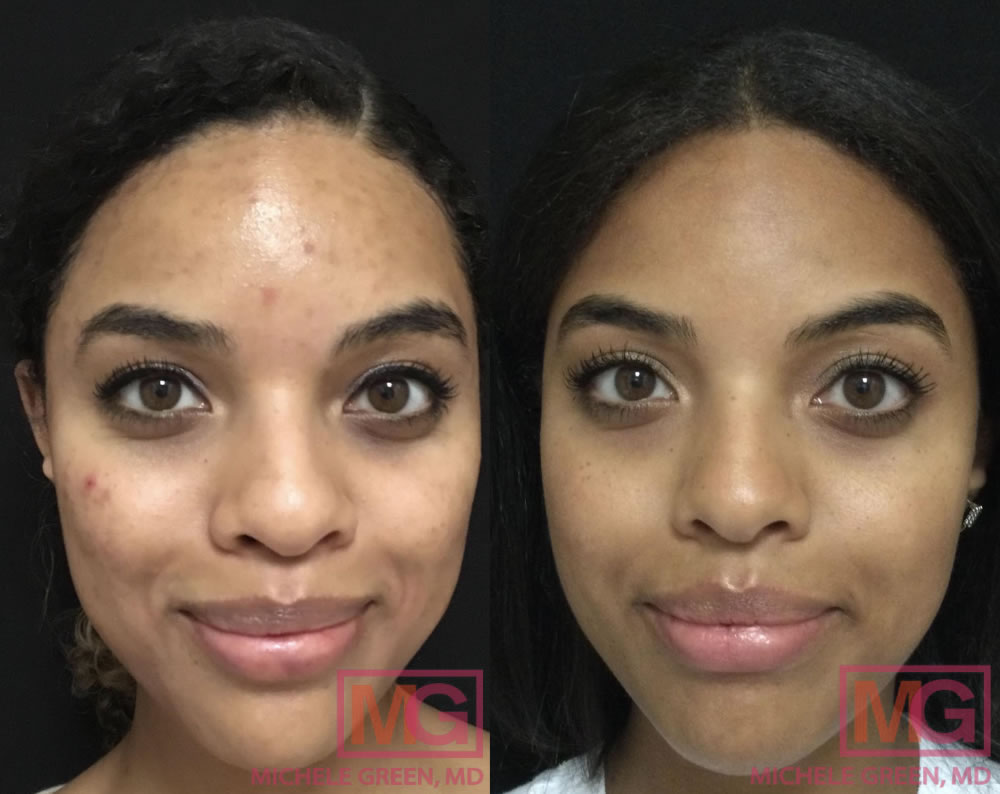
Does Accutane remove scars?
Patients often wonder, “Does Accutane clear scars?” Accutane treatment works specifically to address active acne breakouts and does not remove acne scars. However, by addressing active acne breakouts, Accutane helps to prevent the formation of acne scars in the future. Suppose you have acne scars that have formed previously and would like to eliminate them. In that case, it is safest to wait until after the Accutane treatment has been fully completed before beginning treatment for acne scars. Some of the most effective acne scar treatments include chemical peels, dermal fillers, the eMatrix laser, the Fraxel laser, and the VBeam laser. While on Accutane, however, the only acne scar treatments that are safe to perform would be the VBeam laser treatment and dermal filler treatment. For chemical peels and the eMatrix laser, patients should wait at least 6 months before receiving this treatment. For the Fraxel laser, patients should wait at least one year before undergoing treatment.
Does Accutane cause scarring?
Accutane treatment does not cause scarring. The medication is associated with a number of side effects; however, scarring on the skin’s surface is not one of those side effects. Accutane is one of the most effective treatment options for preventing scarring associated with severe acne breakouts, cystic acne, and nodular acne.
Does Accutane make scars look worse?
Accutane is very effective at preventing the formation of new acne scars. However, while on the medication, existing acne scars may look worse. Some side effects of the medication include dry skin and increased skin sensitivity, which can exacerbate the appearance of old scars. Once you are finished taking the medication, old acne scars should become less noticeable, and, if you are still bothered by their appearance, you can schedule an appointment with Dr. Green to find out the best way to eliminate acne scars.
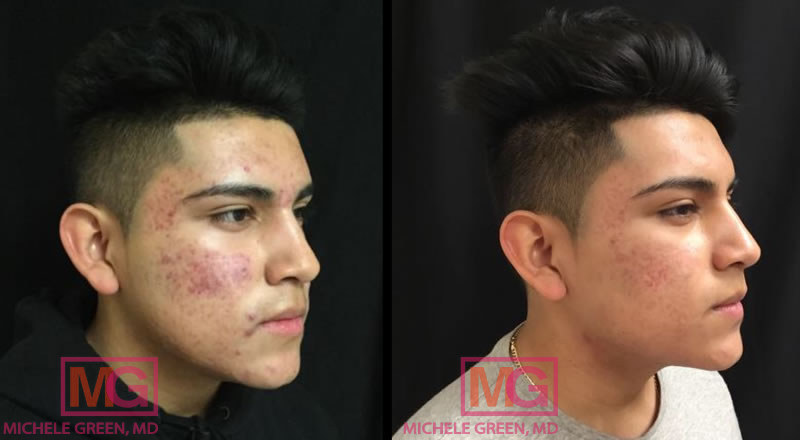
Does Accutane heal scars?
Patients often wonder, “Does Accutane take away scars?” Accutane is highly effective at preventing the formation of acne scars, but it is not used to eliminate existing acne scars. Instead, Dr. Green has many other treatment options available at her Upper East Side, New York City dermatology office:
Chemical Peels: One versatile treatment that Dr. Green will often use for acne scar treatment is chemical peels, which can help with skin resurfacing and rejuvenation. Chemical peels work via the application of an acid solution on the skin’s surface, which causes a reaction on the surface of the skin to encourage skin cell turnover, increase collagen and elastin production, reduce pore size, and correct hyperpigmentation. To address acne scars, Dr. Green will most frequently use 20-40% glycolic acid peels, 10-15% trichloroacetic acid peels (TCA peels), salicylic acid peels, lactic acid peels, or hydroxy acid peels, which can be used for all types of acne scars, but most frequently for atrophic scars. The TCA peel specifically is excellent for ice pick scars. Dr. Green often recommends receiving several chemical treatments spaced four to six weeks apart for the best results.
Laser Resurfacing: Several types of laser resurfacing treatments are available at Dr. Green’s office that work wonders for reducing the appearance of acne scars. Two overarching types of laser treatments exist: ablative laser treatments, which remove the top layer of the skin and require more downtime following treatment, and non-ablative lasers, which use light or heat energy to stimulate collagen production without damaging the top layer of the skin. Whenever possible, Dr. Green will utilize highly effective non-ablative lasers for skin resurfacing, including the VBeam laser, Fraxel laser, and eMatrix laser, for treating acne scars.
Microneedling: Microneedling, which is also sometimes known as collagen induction therapy, works well to address the appearance of atrophic acne scars by boosting the body’s production of collagen to fill in depressions on the surface of the skin. The procedure works by applying tiny, surgical-grade needles that pierce the skin, creating small micro-injuries that trigger the body’s natural healing response. As a result, collagen production increases, which helps repair the skin at the treatment site, resulting in smoother, clearer, and more evenly textured skin. When paired with platelet-rich plasma infusions, the effects of the treatment are even more apparent, and, in addition to reducing the appearance of acne scars, microneedling can help to shrink pore size, eliminate discoloration, improve the appearance of fine lines and wrinkles, and even out stretch marks. As microneedling triggers the body’s natural healing process, the full results of the treatment may take 4-6 weeks to become fully visible. Unlike chemical peels, microneedling should not be used for patients currently experiencing an active acne breakout.
Dermabrasion: A more abrasive treatment for boxcar and rolling acne scars, dermabrasion or microdermabrasion works to essentially “sand” the top layer of skin, boosting collagen production and skin cell turnover. The microdermabrasion machine works to remove the top layer of skin, revealing smooth, healthy skin underneath. It is effective in eliminating various types of scars, including acne scars, pox marks, surgical scars, and stretch marks. Due to the abrasive nature of the treatment, dermabrasion is best for patients with lighter skin tones, as patients with darker skin tones may experience adverse effects, such as post-inflammatory hyperpigmentation. The treatment should also be avoided for patients with an active acne breakout, as there is a risk of infection.
Subcision: Subcision is a minimally invasive surgical procedure that is effective in treating rolling atrophic scars. Rolling scars are caused when the fibrous bands under the skin pull unevenly, resulting in a rippling effect across the skin’s surface. Subcision involves the insertion of a sharp needle that is used to break up the fibrous bands, releasing the tension under the skin. The procedure also stimulates the production of new collagen as part of the healing response, resulting in smooth, evenly textured skin. Several studies have demonstrated the effectiveness of subcision, suggesting that it can provide a permanent improvement in the appearance of acne scars. In a 2005 small study, 90% of recipients surveyed reported being satisfied with the improvement resulting from the procedure.
Does Accutane remove stretch marks?
When it comes to removing stretch marks, Dr. Green will typically turn to laser treatment rather than Accutane. Dr. Green typically uses three main types of lasers to address stretch marks: the V-beam pulsed-dye laser, the eMatrix radiofrequency laser, and the Fraxel fractional laser. The V-beam laser works specifically to target and eliminate pigmentation in the skin, making it most effective for addressing red stretch marks. The laser emits a concentrated beam of light that is absorbed by the pigmentation, causing it to heat up and break apart while the surrounding skin is left unharmed. Dr. Green may also utilize the eMatrix laser for stretch marks. This radiofrequency device enhances the appearance of skin texture and tone, and reduces the visibility of acne scars and stretch marks. The eMatrix laser is safe and effective for patients of all skin types, meaning there is no concern about post-inflammatory hyperpigmentation for patients with darker skin types. Dr. Green will often employ the Fraxel laser for patients with white stretch marks, which are older stretch marks that have lost their pigmentation. The Fraxel laser is highly effective at smoothing out skin depressions and can be used effectively without requiring pigmentation. The first step in determining which treatment option is right for you is to schedule your initial consultation with board-certified dermatologist Dr. Michele Green.
Does Accutane help with pitted scars?
Depressed acne scars form on the skin’s surface when deep infection from an acne breakout damages the skin, inhibiting the ability to produce sufficient collagen to heal the wound. The result is pitted scars on the skin’s surface. As the active acne breakout begins to fade while on Accutane treatment, previously formed acne scars may become more noticeable on the skin. Two acne scar treatments can be performed while a patient is currently taking Accutane: VBeam laser treatment and dermal fillers. The VBeam laser is a gentle laser that is ideal for patients with sensitive skin, as it works to decrease the discoloration and redness of acne scars and can also help reduce the prevalence of P. Acnes bacteria responsible for active acne breakouts. The VBeam laser treatment is most effective when performed in a series of five treatments, spaced approximately four weeks apart. Dermal fillers, such as Restylane, Sculptra, and Juvederm, can also be used while a patient is taking Accutane, and are best for filling in the depressions of atrophic acne scars. Atrophic, or depressed, acne scars form as a result of an insufficient amount of collagen during the healing process, which leaves indentations in the surface of the skin. Dermal fillers can be injected into these depressions to restore lost volume and achieve a smoother skin appearance.
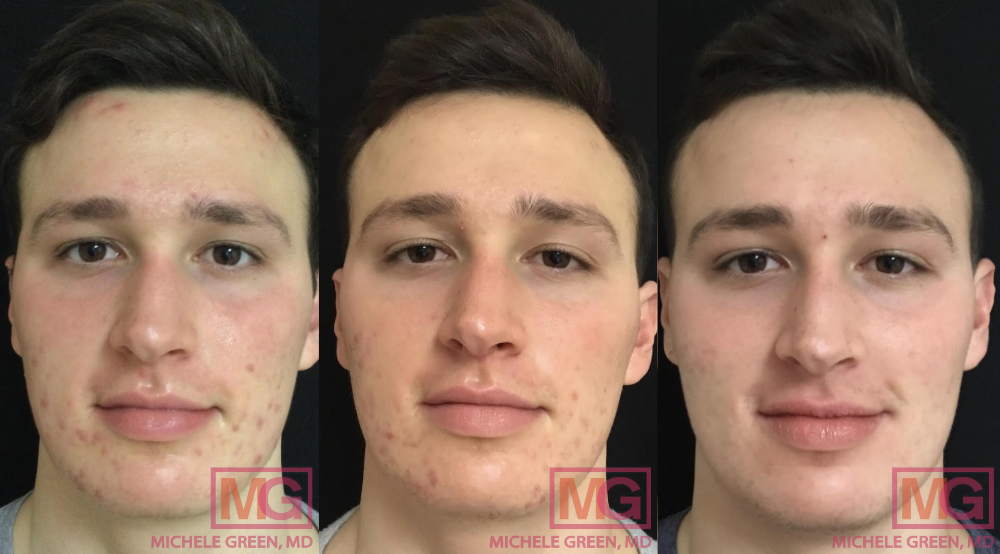
Can Accutane help with scarring?
Accutane medication is one of the most effective treatment options for severe acne breakouts, as it reduces sebum production, decreases inflammation, and enhances skin cell turnover, leading to clearer skin. Severe acne breakouts are the most likely to lead to scarring in the future, as the bacterial infection in the pores often penetrates deeply, damaging the skin and hindering the healing process. When left untreated, severe acne breakouts will often lead to depressed or raised acne scars that will remain visible for many years after the initial breakout has cleared. When Accutane is used to treat severe acne, it helps prevent the formation of acne scars, allowing patients to maintain clear skin for years to come.
How to get started with acne scar treatment today
There is no one-size-fits-all treatment when it comes to getting rid of acne scars; rather, the best treatment option depends on the type of acne scars on the skin, the presence of an active breakout of pimples, and a patient’s skin tone or skin texture. When you have your initial consultation with Dr. Green, she will examine the treatment area and determine the treatment, or combination of treatments, that will best meet your needs. To treat atrophic scars, Dr. Green often employs chemical peels, laser resurfacing, microneedling, dermal fillers, or prescribes at-home serums and creams containing alpha-hydroxy acid, lactic acid, topical retinoids, or salicylic acid. For hypertrophic scars, Dr. Green may use corticosteroid injections to flatten the raised scar. For hyperpigmentation, intense pulsed light treatments, such as the V-Beam laser, can be used to address discoloration or redness that remains due to scarring. No matter a patient’s type of acne scar or skin type, Dr. Green has a treatment available to improve the appearance of acne scars with little to no downtime.
Dr. Michele Green is an internationally renowned board-certified dermatologist with over two and a half decades of experience providing her patients with the best non-invasive treatment options. Dr. Green takes a holistic approach, embracing a less-is-more philosophy, and creates customized skincare routines and treatment plans that cater to the unique concerns and aesthetic goals of her patients. She is consistently identified as one of New York’s best dermatologists by Castle Connolly, New York Magazine, and Super Doctors for her dedication to her patients and expertise. Please call us at 212-535-3088 or email our New York City-based office today to schedule a consultation with Dr. Michele Green and find out if Accutane is the best treatment option for you.
 212-535-3088
212-535-3088